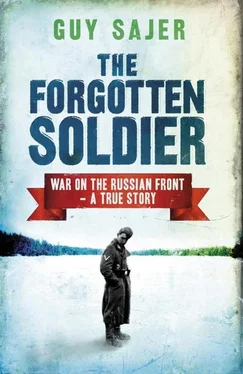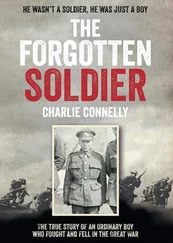As it grew light, the cumulative exhaustion of many months seemed to crush our shoulders. We were now able to see the numerous gray outlines of ships, including many warships, riding at anchor on both sides of the peninsula. As we looked, the air-raid alarm sounded. Our eyes turned to the sky, as rumors began to circulate through the crowd.
“No panic!” shouted the police. “Our anti-aircraft defenses will hold them off!”
By now, we knew what that meant. All the shelters were filled with wounded, and each of us had to find what protection he could. If the bombs fell near the harbor, there would be an impressive carnage.
We moved toward an old hulk pulled up on the shore, whose tarred timbers might be able to ward off a few blows. We hadn’t quite reached it when the massive crackle of an anti-aircraft barrage burst all around us, fired by our coastal defenses or by one of the warships we had glimpsed earlier. This was my first experience of such a barrage. The falling fragments alone were capable of no small damage.
To the east, the sky was spattered with numberless black spots. The noise of firing was so loud that we couldn’t hear the planes approaching. Finally we saw three of them, flying quite low, parallel to the shore, pursued by the black granules of exploding flak. We heard an explosion to the south, over the water; one of the planes must have been hit. The police had not been exaggerating — not one plane flew over Hela. We felt a wave of confidence and security; finally, the Russians had been stopped.
The police came and checked our cards.
“Be back here for embarkation on the 31 of March,” a noncom told us.
“While you’re waiting, you can make yourselves useful north of town.”
We took ourselves off without any questions.
“What is the date today?” Hals asked.
“Wait a minute,” Wollers said. “There’s a calendar in my diary.” He looked through his pocket, but couldn’t find it.
“In any case, we’re not ahead of ourselves.”
“But we ought to know, all the same,” Hals persisted. “I would like to know exactly how much longer we have to wait.”
We finally learned that it was Sunday, the 28th or 29th of March, and that we would have to wait for two days, as I remember: the last two days of the Ost Front , which had consumed so much of our lives.
We spent those two days in the throng of anxious refugees camping out on the narrow Hela peninsula.
There were two more attempted Russian air raids. The last victim I was to see was a dirty white horse.
A Russian plane had been hit, and was disintegrating above us. We all watched as the forward part of the plane, whose racing engine gave off a long howl, plunged toward the ground. The noise terrified the animal, which slipped its collar and galloped, whinnying, toward the spot where the roaring mass of metal would land. It must have taken about three steps before it was hit. Its flesh was scattered for over fifteen yards in all directions.
On the evening of April 1, during a spell of terrible weather, we boarded a large white ship, which must, at one time, have taken rich people on cruises. Despite the anxiety we all felt, despite the crowd, and the stretchers, and the wounded, with their rattling breath, my eyes gaped at all the magnificent and barely-faded details inside that elegant ship. I was reminded of the shop windows my father had always taken me to admire at Christmastime. But I didn’t have the courage to rejoice; I knew that such feelings always end badly.
In the darkness, our boat pressed forward through the large hollow waves. A short while before, the sound and light which had filled the sky over the other shore of the Bay of Danzig had still reached us. Our comrades were still fighting and dying there. We scarcely dared think of the good fortune that had saved us — and that troubled us. For two days, our boat slid across the sea, toward the unbelievable West, which we had dreamed of for so long, where we could not imagine the war. We learned that our ship was the Pretoria , and although we were allowed only a small space on the bridge, lashed by wind and rain, the sweetness of the moment made us forget food and drink.
Of course, a torpedo could send us to the bottom at any minute, but we didn’t think of that. We also had a battleship escort; everything was going very well.
We arrived in Denmark, where we saw things we had almost forgotten, like pastry shops, which we devoured with enormous eyes, forgetting our filthy faces ravaged by misery. We scarcely noticed the looks of mistrust fixed on us by the shopkeepers, who couldn’t understand us. We had no money, and the wares on display were not free. For a moment, we even thought of our machine guns.
Hals could not resist temptation. He held out his big hands, which looked like dead wood, and begged for charity. The shopkeeper tried to pretend that he hadn’t noticed, but Hals persisted. Finally, the baker put a stale cake into those filthy hands. Hals divided it into four pieces and we tasted a substance which had become unknown to us. We thanked the man, and tried to smile, but the rotting teeth in our gray faces must have produced an effect of grotesque grimace, and made the baker think we were mocking him. He turned on his heel, and disappeared into the back of his shop. He couldn’t know bow long it had been since we’d had the chance to laugh, and that we would need a little while to learn how again.
A less sumptuous boat took us on to Kiel, where we found a more familiar atmosphere, with no more bakeries and no more occasion to smile. In a setting of ruins, we were reincorporated, with alarmingly precipitate haste, into a scratch battalion. Hals asked if he might be given a leave to visit his home in Dortmund. An enlisted man of about fifty put a hand on his shoulder and told him that with a little courage and a little luck, if he managed to infiltrate the American and British lines, he might perhaps get there.
My friend’s face reflected astonishment, stupefaction, and sadness.
“The American and British lines!”
In the West, which we had dreamed of and longed for so often, which we had finally reached, we were assaulted by the most overwhelming and terrible news. We were astounded. The West, the paradise we had been counting on in our icy holes at Memel, on the Dnieper, and on the Don; that chimerical paradise which should have taken us in and soothed our sufferings, the West, which had been our sole reason for surviving, was only a small country more or less thickly covered with buildings; a country where the silence was broken by the roar of planes, where terrified people crawled and ran. The West was also three dirty gray trucks carrying at high speed a reduced battalion of soldiers in gray toward another encounter with death; it was the place where my last illusions would crumble in conditions of inhuman grief.
The West was the other half of the vise tightening on our misery. Several armies were challenging our exhausted arms — several, among them the French Army. I cannot describe the emotions which this news produced in me. France, which in my thoughts had never abandoned me, “la douce France,” had abused my naïveté. In the trenches of the steppe, I had loved France as much as any young man does as he talks revolution in the back room of a Paris café.
Most of my efforts had been for France, which I had made my comrades-in-arms appreciate and love. What could have happened, which had not been explained to us?
France had turned against me, when I was expecting her help. Perhaps I would have to fire at my French brothers — which I could no more do than I could fire at Hals or Lindberg.
What had happened? What had they kept from us? I no longer knew, or understood. My brain refused to take in any more, and the hope which the West had revived in all of us died in me.
Читать дальше












